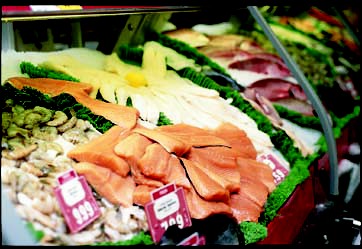User login
MAUI, HAWAII – The relationship between diet and acne risk has grown more intriguing as a consequence of a recent Italian study linking milk consumption to an increased risk, while eating fish had a protective effect.
"This was a well-done, very large, multicenter case-control study," said Dr. Lawrence F. Eichenfield, who presented highlights of the Italian investigation at the Hawaii Dermatology Seminar sponsored by Global Academy for Medical Education/Skin Disease Education Foundation.
A diet-acne link has been an endless topic of debate for many years among dermatologists and dieticians, with the public looking on attentively. Conventional wisdom formerly held that chocolate and greasy foods exacerbated acne, a notion that later was dispelled. A recent literature review of 27 published studies implicated high-glycemic-index foods and milk (J. Acad. Nutr. Diet. 2013;113:416-30).
The Italian study Dr. Eichenfield spotlighted included 205 consecutive patients aged 10-24 years who were newly diagnosed with moderate to severe acne. The control group consisted of 358 patients with no or only mild acne who consulted a dermatologist for a concern other than acne. Investigators inquired about family history, diet, personal habits, and menstrual history.
Family history of acne emerged as a strong risk factor. A history of acne in a first-degree relative was associated with a 3.4-fold increased risk of moderate to severe acne.
Drinking milk more than three times per week was associated with a 1.8-fold increased risk of significant acne. The risk was more pronounced in skim-milk drinkers than whole-milk drinkers, with consumption of more than three servings per week of nonfat milk being associated with a 2.2-fold increased risk of moderate to severe acne (J. Am. Acad. Dermatol. 2012;67:1129-35).
In contrast, regular consumption of fish was associated with a 32% reduction in the likelihood of having moderate to severe acne.
Body mass index was *directly associated with acne: Adolescents and young adults with a BMI greater than 18.5 kg/m2 were at 1.9-fold greater risk of significant acne than those with a smaller BMI. This protective effect of a low BMI was stronger in male than female subjects.
Neither menstrual factors nor smoking showed any relationship with acne risk in the Italian study, noted Dr. Eichenfield, professor of clinical pediatrics and medicine at the University of California, San Diego.
"How do I take this new information and use it in the clinic? The answer is, I don’t, because I really don’t know what the impact will be of dietary changes in my actual care of individuals with acne who come to me. But this whole issue of diet and acne is a really fascinating one," the pediatric dermatologist commented.
SDEF and this news organization are owned by the same parent company.
Dr. Eichenfield reported receiving research grants for clinical investigations from half a dozen pharmaceutical companies.
*Correction (04/09/13): A previous version of this story mischaracterized the association between BMI and acne in one instance. This story has been updated.
MAUI, HAWAII – The relationship between diet and acne risk has grown more intriguing as a consequence of a recent Italian study linking milk consumption to an increased risk, while eating fish had a protective effect.
"This was a well-done, very large, multicenter case-control study," said Dr. Lawrence F. Eichenfield, who presented highlights of the Italian investigation at the Hawaii Dermatology Seminar sponsored by Global Academy for Medical Education/Skin Disease Education Foundation.
A diet-acne link has been an endless topic of debate for many years among dermatologists and dieticians, with the public looking on attentively. Conventional wisdom formerly held that chocolate and greasy foods exacerbated acne, a notion that later was dispelled. A recent literature review of 27 published studies implicated high-glycemic-index foods and milk (J. Acad. Nutr. Diet. 2013;113:416-30).
The Italian study Dr. Eichenfield spotlighted included 205 consecutive patients aged 10-24 years who were newly diagnosed with moderate to severe acne. The control group consisted of 358 patients with no or only mild acne who consulted a dermatologist for a concern other than acne. Investigators inquired about family history, diet, personal habits, and menstrual history.
Family history of acne emerged as a strong risk factor. A history of acne in a first-degree relative was associated with a 3.4-fold increased risk of moderate to severe acne.
Drinking milk more than three times per week was associated with a 1.8-fold increased risk of significant acne. The risk was more pronounced in skim-milk drinkers than whole-milk drinkers, with consumption of more than three servings per week of nonfat milk being associated with a 2.2-fold increased risk of moderate to severe acne (J. Am. Acad. Dermatol. 2012;67:1129-35).
In contrast, regular consumption of fish was associated with a 32% reduction in the likelihood of having moderate to severe acne.
Body mass index was *directly associated with acne: Adolescents and young adults with a BMI greater than 18.5 kg/m2 were at 1.9-fold greater risk of significant acne than those with a smaller BMI. This protective effect of a low BMI was stronger in male than female subjects.
Neither menstrual factors nor smoking showed any relationship with acne risk in the Italian study, noted Dr. Eichenfield, professor of clinical pediatrics and medicine at the University of California, San Diego.
"How do I take this new information and use it in the clinic? The answer is, I don’t, because I really don’t know what the impact will be of dietary changes in my actual care of individuals with acne who come to me. But this whole issue of diet and acne is a really fascinating one," the pediatric dermatologist commented.
SDEF and this news organization are owned by the same parent company.
Dr. Eichenfield reported receiving research grants for clinical investigations from half a dozen pharmaceutical companies.
*Correction (04/09/13): A previous version of this story mischaracterized the association between BMI and acne in one instance. This story has been updated.
MAUI, HAWAII – The relationship between diet and acne risk has grown more intriguing as a consequence of a recent Italian study linking milk consumption to an increased risk, while eating fish had a protective effect.
"This was a well-done, very large, multicenter case-control study," said Dr. Lawrence F. Eichenfield, who presented highlights of the Italian investigation at the Hawaii Dermatology Seminar sponsored by Global Academy for Medical Education/Skin Disease Education Foundation.
A diet-acne link has been an endless topic of debate for many years among dermatologists and dieticians, with the public looking on attentively. Conventional wisdom formerly held that chocolate and greasy foods exacerbated acne, a notion that later was dispelled. A recent literature review of 27 published studies implicated high-glycemic-index foods and milk (J. Acad. Nutr. Diet. 2013;113:416-30).
The Italian study Dr. Eichenfield spotlighted included 205 consecutive patients aged 10-24 years who were newly diagnosed with moderate to severe acne. The control group consisted of 358 patients with no or only mild acne who consulted a dermatologist for a concern other than acne. Investigators inquired about family history, diet, personal habits, and menstrual history.
Family history of acne emerged as a strong risk factor. A history of acne in a first-degree relative was associated with a 3.4-fold increased risk of moderate to severe acne.
Drinking milk more than three times per week was associated with a 1.8-fold increased risk of significant acne. The risk was more pronounced in skim-milk drinkers than whole-milk drinkers, with consumption of more than three servings per week of nonfat milk being associated with a 2.2-fold increased risk of moderate to severe acne (J. Am. Acad. Dermatol. 2012;67:1129-35).
In contrast, regular consumption of fish was associated with a 32% reduction in the likelihood of having moderate to severe acne.
Body mass index was *directly associated with acne: Adolescents and young adults with a BMI greater than 18.5 kg/m2 were at 1.9-fold greater risk of significant acne than those with a smaller BMI. This protective effect of a low BMI was stronger in male than female subjects.
Neither menstrual factors nor smoking showed any relationship with acne risk in the Italian study, noted Dr. Eichenfield, professor of clinical pediatrics and medicine at the University of California, San Diego.
"How do I take this new information and use it in the clinic? The answer is, I don’t, because I really don’t know what the impact will be of dietary changes in my actual care of individuals with acne who come to me. But this whole issue of diet and acne is a really fascinating one," the pediatric dermatologist commented.
SDEF and this news organization are owned by the same parent company.
Dr. Eichenfield reported receiving research grants for clinical investigations from half a dozen pharmaceutical companies.
*Correction (04/09/13): A previous version of this story mischaracterized the association between BMI and acne in one instance. This story has been updated.
EXPERT OPINION FROM SDEF HAWAII DERMATOLOGY SEMINAR

